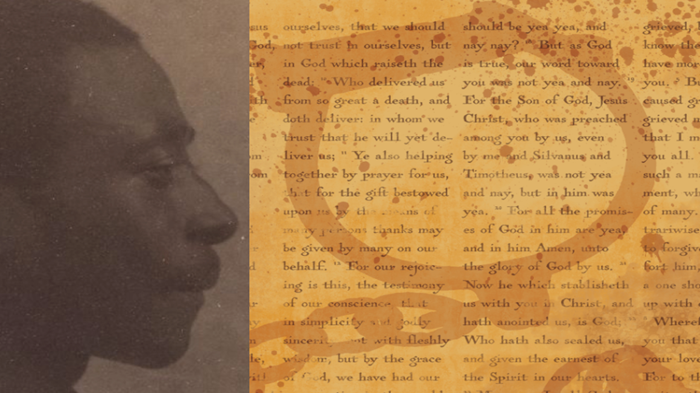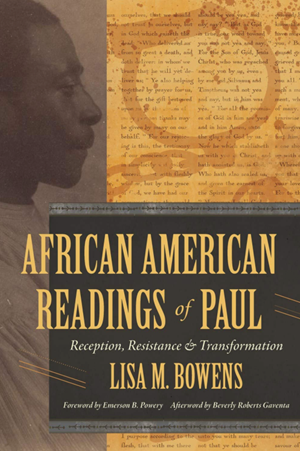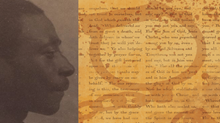Snatching Paul from White Slaveholders

Deep in American history is the enslavement of Africans in order to exploit their bodies for labor turned into profit. Running along side slavery – and keeping pace – was the belief that slavery was biblically justified and that Africans were inferior to whites.
At the heart of this deep slavery was the use of the apostle Paul’s words that slaves were to submit to their masters (Eph 6:5; Col 3:22). Here are Paul’s words:
Eph. 6:5 Slaves, obey your earthly masters with fear and trembling, in singleness of heart, as you obey Christ;
Col. 3:22 Slaves, obey your earthly masters in everything, not only while being watched and in order to please them, but wholeheartedly, fearing the Lord.
In Lisa Bowens brilliant new book, African American Readings of Paul, these texts are noted along with white supremacy, white hermeneutics, and white control of black worship and preaching. What makes her book so valuable is how the apostle Paul was appropriated by enslaved Africans in America to turn the supposed, embodied, and instuted supremacy by whites on its head.
Paul could be used as a form of resistance.
This is a special book in its painstaking historical culling of sources largely unknown and for showing how the apostle Paul was read by American slaves. It should be in every theological iibrary, and it can be used as a textbook in hermeneutics classes to examine how Paul has been read and still can be read.
Social impositions of inferiority are the context:
For instance, in 1787 the US Constitution declared an enslaved African to count as three-fifths of a person, and between 1830 and 1860, Southern states increasingly prohibited manumission, expelled freed blacks, eliminated black churches, and ignored penalties for hurting or killing blacks. Views of black inferiority and black inhumanity were propagated widely and believed by people across the spectrum of society.
Slaves often “followed the rules” to express resistance as can be seen in a 1774 petition to the powers in Massachusetts:
The Petition of a Grate Number of Blackes of this Province who by divine permission are held in a state of Slavery within the bowels of a free and christian Country Humbly Shewing …
… in which Paul was used to cut into the fabric of slavery as an institution in a supposed Christian nation.
A summarizing statement by Bowens (my emphasis):
We can extrapolate from both the historical environment of the time and the specific words of Paul that these writers chose to include in their requisition that their act of interpreting Paul on their own terms was an act of resistance and protest; an act that can be delineated for heuristic purposes in three ways: (1) They began their interpretation of Scripture where they wanted to begin (Eph. s:zz; Col. 3:18-20) and not where their white enslavers chose to begin. This meant they were “seizing hermeneutical control” of Pauline Scripture. (2) They engaged in “exegetical reversal,” disputing whites’ ownership of Paul to sanction slavery, and instead proclaimed that Paul condemns slavery with his very words. (3) They appealed to familial language to undercut “slaveholding religion.”

Another petition:
Similar to the petitioners in 1776, the slaves in Fairfield County, Connecticut ... requested freedom in 1779.
Their major ideas, again appealing to Paul:
First, the writers state unequivocally that they are “Creatures of that God who made of one Blood, and Kindred, all the Nations of the Earth.” … Second, the enslaved Africans challenged the predominant ideas that they were ordained to slavery by God … Third, the writers appealed to a common Adamic ancestry, for they too were of the “Race of Adam, our Common Father.” … Fourth… the authors of this peitition boldly call slavery evil, wicked, and a sin.
Thus, she ties this into their hermeneutic:
They were not intellectually inferior, neither were they created to live in slavery, but as children of Adam, with families and the human right to be free, they also had the right to interpret Scripture for themselves and not to rely upon any white supremacist interpretive strategy.
Her lengthy chapter studies a number of individuals, beginning with Jupiter Hammon, and Bowens’ summary:
Though Hammon is not as radical in his use of Paul as some other black writers, he does employ the apostle in a number of important, subversive ways: (1) to underscore black agency, (2) to critique the white wealthy and powerful, (3) to make the charge that whites were under satanic influence, (4) to assert blacks as rational human beings, (S) to proclaim blacks’ humanity and identity as sons of God, not Ham, and (6) to lament over his fellow enslaved Africans.
I really liked this statement:
To dare to interpret Paul in such ways in public places and spaces secures Hammon’s position as one of the important starting points for African American Pauline hermeneutics.
Jesus Creed is a part of CT's
Blog Forum. Support the work of CT.
Subscribe and get one year free.
The views of the blogger do not necessarily reflect those of Christianity Today.




















